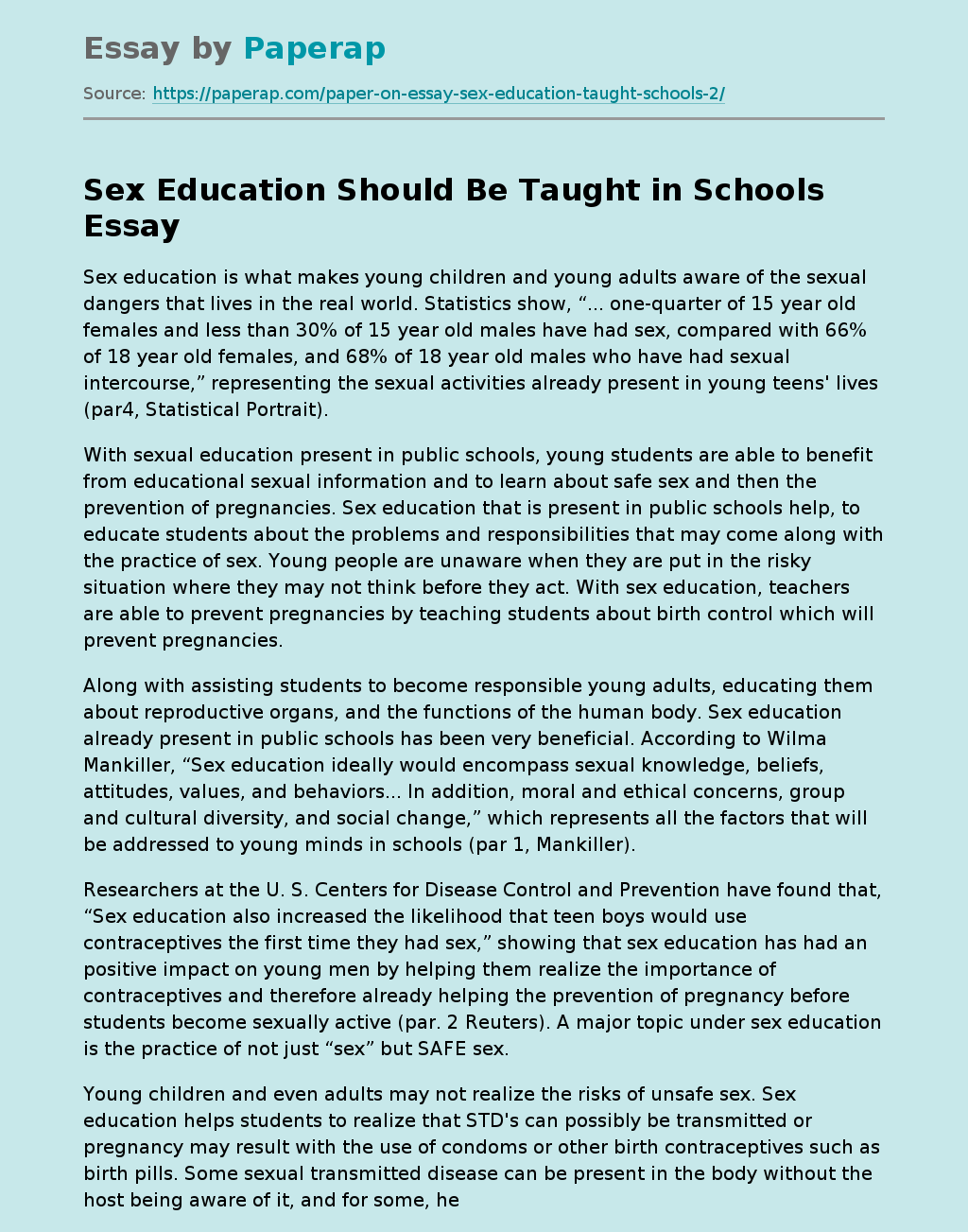Sex Education Should Be Taught in Schools
Sex education is what makes young children and young adults aware of the sexual dangers that lives in the real world. Statistics show, “… one-quarter of 15 year old females and less than 30% of 15 year old males have had sex, compared with 66% of 18 year old females, and 68% of 18 year old males who have had sexual intercourse,” representing the sexual activities already present in young teens’ lives (par4, Statistical Portrait).
With sexual education present in public schools, young students are able to benefit from educational sexual information and to learn about safe sex and then the prevention of pregnancies.
Sex education that is present in public schools help, to educate students about the problems and responsibilities that may come along with the practice of sex. Young people are unaware when they are put in the risky situation where they may not think before they act. With sex education, teachers are able to prevent pregnancies by teaching students about birth control which will prevent pregnancies.
Along with assisting students to become responsible young adults, educating them about reproductive organs, and the functions of the human body. Sex education already present in public schools has been very beneficial. According to Wilma Mankiller, “Sex education ideally would encompass sexual knowledge, beliefs, attitudes, values, and behaviors… In addition, moral and ethical concerns, group and cultural diversity, and social change,” which represents all the factors that will be addressed to young minds in schools (par 1, Mankiller).
Researchers at the U. S. Centers for Disease Control and Prevention have found that, “Sex education also increased the likelihood that teen boys would use contraceptives the first time they had sex,” showing that sex education has had an positive impact on young men by helping them realize the importance of contraceptives and therefore already helping the prevention of pregnancy before students become sexually active (par.
2 Reuters). A major topic under sex education is the practice of not just “sex” but SAFE sex.
Young children and even adults may not realize the risks of unsafe sex. Sex education helps students to realize that STD’s can possibly be transmitted or pregnancy may result with the use of condoms or other birth contraceptives such as birth pills. Some sexual transmitted disease can be present in the body without the host being aware of it, and for some, he or she is unaware of both sexually transmitted disease and if they are present in the body. Not knowing that it is present, safe sex would help prevent the spread of these STD’s in society.
Early pregnancies are life changing. According to the advice of Michelle Mitchell, an early teen mother, “Use all the birth controls you can and listen to what the people are saying: Protect yourself, don’t have sex, use abstinence, because having babies young is not easy” (par. 6, Glazer). Michelle Mitchell cannot go back in time but does not hesitate to warn others before it is too late for other young teens. However, due to religious reasons and family values that stress on marriage before intercourse, many parents may be against sex education in schools.
However, it is better to have children be aware of sex, the risks, the changes, and the benefits, rather than keeping all knowledge away from young minds. It will give children a better chance to understand the right facts rather than having them stealthily and dangerously discover sex on their own. The more parents try to prevent something, the more their children will go against what their parents want, so it is better to play it safe, and to keep children aware of sex and all its topics.
Whether a child is religious or not, morals or no morals, ethics or no ethics they are bound to become curious and exposed to sex. Patrick Collins, a 17-year old student believes, “When hormones start kicking in, [students] want to experiment. Having sex is a natural thing; it’s a matter of when you have sex, and I believe making love should be in the confines of marriage” (par. 28, Natale). Sooner or later, whether or not religious parents have family values or if there is sex education in schools, the curiosities of sex will take its course in the minds of their children.
Sex education is what develops the minds of young children and alerts them to what the future will bring. Even though there are some who are against sex education, sex education is beneficial in numerous ways than its negatives. Sex education’s purpose is to educate young student’s minds of the risks of sex and how it may impact their lives if taken through the wrong course. With sex education, young adults will be able to use contraceptives, be aware of STD’s, pregnancies, and the unknown functions of the body.
It has changed the rate of pregnancies positively, it has changed the perspectives of the sexually active to practice safe sex, and to leave them attentive for the future challenges to come, and therefore should be present in all public schools.
Work Cited Page Internet Web Site: Fox, Maggie & Briand, Xavier. “Sex Education Found to Help Teenagers Delay Sex”. Reuters. n. d. December 19, 2007. Web n. p. “A Statistical Portrait of Adolescent Sex, Contraception, and Childbearing. National Campaign. 1996. n. p. Sound Vision. Web. n. p. Database: Glazer, Sarah. “Preventing Teen Pregnancy. ” CQ Researcher. 14 May 1993:411+SIRS Researcher. Web. 27 Oct 2010 Book Reference: Mankiller, Wilma, and others. “Sex Education. ” The Reader’s Companion to U. S. History. December 1, 1998: n. p. SIRS Researcher. Web. 27 Oct 2010 Magazine: Natale, Jo Anne. “The Hot New World in Sex Ed. ” American School Board Journal. June 1995: 18-26. SIRS Researcher. Web. 27 October 2010
Sex Education Should Be Taught in Schools. (2019, Jun 20). Retrieved from https://paperap.com/paper-on-essay-sex-education-taught-schools-2/

